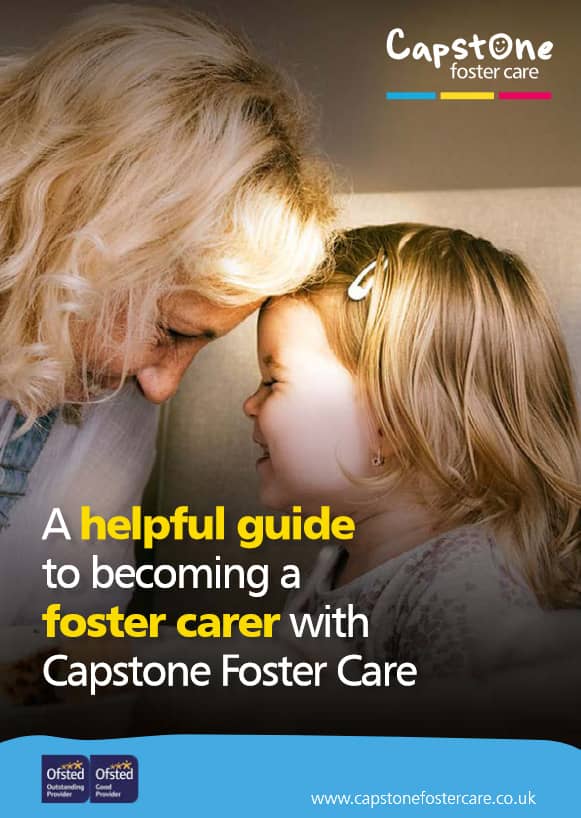


Fostering a disabled child
The role of an independent fostering agency
How to choose a foster care agency
Can I choose who I foster?
What are the benefits of fostering with an independent fostering agency?
What happens when a child is taken into care?
Fostering process: what happens on an initial home visit?
Fostering with local authority vs independent agency
A complete guide to becoming a foster carer
How Are Children in Foster Care Matched with Carers?
Foster Care Budgeting Tips
Becoming A Foster Carer
What is a Care Leaver?
What is a Foster Carer?
Fostering Regulations
How long does it take to become a Foster Carer?
What are the Foster Care requirements?
Changing IFA - Transferring to Capstone
8 reasons why a child may be taken into care
Fostering as a Career
Can you foster if you smoke or vape?
A guide to fostering assessments
LGBTQ+ Fostering
Equality, Inclusion & Anti-discriminatory Practice in Foster Care
What can disqualify you from foster care?
Can you foster if you’re on benefits?
Top transferable job skills to become a foster carer
Fostering as a same sex couple
Fostering while renting
Can you foster if you have mental health issues?
Is there an age limit for fostering in the UK?
Do foster carers get a pension?
How to foster a child: A step by step guide
How do DBS Checks Work?
Can I foster if...?
Mythbusting the top 10 Foster Care Myths
Can I foster if I am disabled?
LGBT Fostering Mythbusting
Can I foster if I have pets?
Can I Foster A Child?
Can I Foster and Work?
Can you Foster with a Criminal Record
Can Single People Foster?
LGBT Family and Foster Care
Fostering across Cultures
Muslim Fostering
Christian Foster Care
Sikh Fostering
Empty Nest Syndrome and Foster Care
Can I Foster?
What is the difference between residential care and foster care?
Fostering Babies and Young Children
What is Kinship Care?
Fostering Babies - Myths
Focusing on Parent & Child Fostering
Fostering Siblings
Fostering Teenagers
Fostering Teenagers - Breaking down the Myths
Fostering Unaccompanied and Asylum Seeking Children
Mother and Baby Foster Placements
Private Fostering
How does therapeutic fostering work?
Young Children Fostering Placements
Difference between short and long-term fostering
Types of self-harm
A Guide to the Foster Care Handbook
Reunification and Birth Parents: A Guide for Foster Carers
What is an EHC Plan? A Guide for Foster Carers
How to prepare a child for becoming a care leaver
Children who foster: impact of fostering on birth children
Fostering LGBTQ+ Youth
How to prepare your home for a foster child
How to help a lonely child: A Guide for Foster Carers
What are the National Minimum Standards for Fostering Services?
10 tips for foster children's education
How to prepare your foster child for secondary school
Tips for coping when foster placements end
Tips for foster parents during Coronavirus
What happens if foster parents get divorced?
5 ways to manage Mother's Day with foster children
Tips for managing foster children's bedtime routines
How to handle foster child bullying
Fostering allowances and the gender pay gap
What discounts can foster carers get?
How to adopt from Foster Care
5 ways to manage Father's Day for children in foster care
8 most common fostering challenges
FosterTalk Membership with Capstone Foster Care
Supporting foster children's contact with birth families
A guide to independent fostering
Keeping Children Safe Online: A Guide For Foster Carers
Movies About Foster Care
Play-based learning strategies for foster carers
A Guide to the Staying Put Program
How to deal with empty nest syndrome
How to recognise signs of depression in foster children
Can you take a foster child on holiday?
Tips and advice on fostering with a disability
10 tips on connecting with your Foster Child
Fostering vs Adoption - What's the difference?
How Fostering can change a future
How to adopt from Foster Care
How to encourage children to read in Foster Care
How to prepare a Foster Child's bedroom
Reading and Storytelling with Babies and Young Children
Supporting Children's Learning
The 20 most recommended books Foster Carers and young people should read
Things you can do when your children leave home
The impact of early childhood traumas on adolescence and adulthood
Anxious Disorders in Foster Children
What is sexual abuse and sexual violence
Foster Child behaviour management strategies
Foster Parent Advice: What to expect in your first year of fostering
Capstone's twelve tips at Christmas
10 celebrities who grew up in Foster Care
Could Millenials be the solution to the Foster Care crisis?
Do you work in Emergency Services?
Form F Assessor and Assessment Training
Foster Care Fortnight
Improving Children's Welfare - Celebrating Universal Children's Day
New Year - New Career - Become a Foster Carer
Young People Charities
If you're new to fostering, you might be wondering exactly what private fostering is and how it differs from local authority fostering and kinship arrangements. In this guide, we’ll break down everything you need to know, including how private foster care is classified.
Private fostering refers to the care of a child under the age of 16 that is made without the involvement of a local authority. Private fostering can also be applicable to the care of a child over 16 if that child is disabled. Private foster care is arranged between the child’s parent with the intention that the arrangement should last for 28 days or more and that the child should be provided with continuous care.
Not everyone can be a private foster carer for a specific child. A parent or close relative cannot become a private foster carer. Under the Children Act 1989, a close relative is defined as a grandparent, brother, sister, uncle or aunt (whether of full-blood or half-blood or by marriage) or step-parent. If a close relative becomes involved in caring for the child, it is considered kinship care. However, a member of the extended family, such as a cousin or great aunt can be a foster carer.
No, fostering through an independent foster care agency, like us here at Capstone Foster Care, is not the same as becoming a private foster carer. This is because if you foster for an Independent Foster Care Agency, you’ll be fostering a child who has been taken into care when a Care Order has been given under the Children Act of 1989.
In Private Fostering, the parent is financially responsible for the child. The private foster carer can check into what, if any, welfare benefits they might be entitled to because the child is living in their household, such as a Child Tax Credit. However, the parent is the one who is responsible for the cost of maintaining the child. This differs from fostering through an Independent Foster Care Agency, as you’ll receive a fostering allowance to pay for your child’s needs and to remunerate you for your time and skill.
When a child is placed into private foster care, parental consent is usually necessary, although there are certain circumstances where young people can make their own arrangements. For example, they might be an unaccompanied asylum seeker. Often, young people will drift from one friend’s place to another, relying on those families for food and shelter. It may be that their home life is not working out for them, and they don’t know how to look for support from schools or relevant agencies. That's why it helps to understand how the law can help. If you are aware of a child in need of assistance, notify children’s social care.
Often, privately fostered children can be vulnerable. As a result, the National Minimum Standards for Private Fostering were established in 2005 to allow the local authority to assess private carers. Before this, there was no requirement for anyone to check up on the welfare of a child in private foster care. The National Minimum Standards guidelines set out the role of the local authority in private fostering, which is to ensure that there are adequate safeguards in place to protect the child.
Parents and carers should notify the local authority when a private fostering arrangement is made. Even though the local authority is not involved in the parent’s decision for the child to stay with a private carer, they are responsible for ensuring their new home meets the needs of the child.
In private fostering, the parent or the person with parental responsibility is the one who makes any decisions about the child even though the child is not living with them. The parent may delegate some decisions to the private foster carer. It makes daily life easier if the fostering carer can decide on immunisations, visits to the doctor or dentist, and school trips without consulting the parent. However, if the parent wants to override any of the decisions the foster carer makes, they can do so.
If you would like more information or advice, contact Capstone Foster Care or your local authority. Privately fostering a child can be rewarding but it can also be challenging to work with a child, providing education and other services without having decision-making rights. Call us on 0800 012 4004 or download a brochure today.
If you’ve got any questions or would like to find out more about fostering with Capstone, fill out the form below.
An experienced fostering advisor from your local area will then be in touch.

Start the conversation today. Our team of friendly advisors are on hand to answer any foster care questions you may have. We can offer you honest and practical advice that can help you decide if becoming a foster carer is the right path for you.


